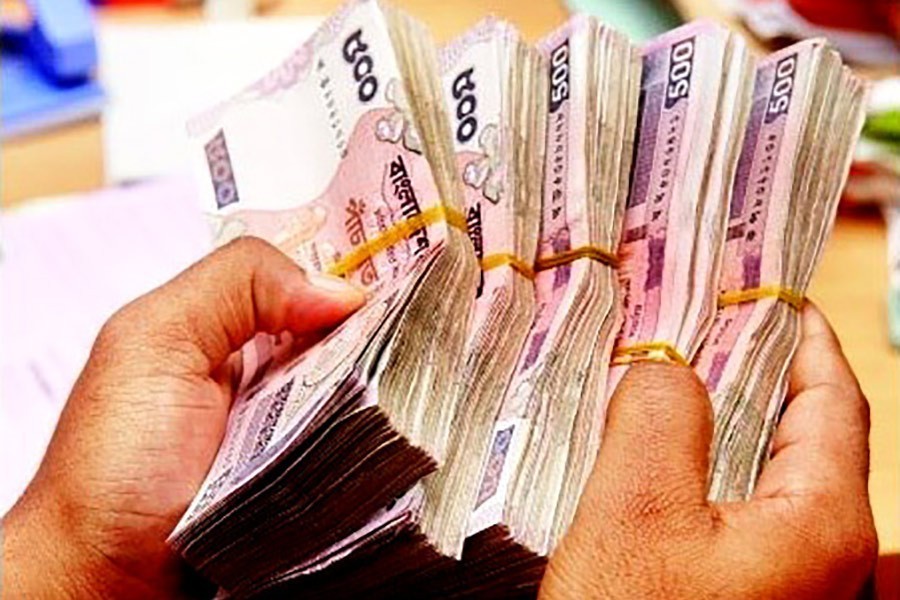The government would offer the undisclosed money holders yet another opportunity to legalise their income in the next fiscal year (FY2021-22), but with harder terms than that of the existing ones.
The holders of such money may have to pay tax at normal rate, ranging from 5.0 per cent to 25 per cent, plus a penal tax of 5.0 per cent, officials having knowledge about the development told the FE.
The change is expected to be incorporated in the Finance Bill-2021 to be placed in parliament tomorrow (Tuesday), when the bill is scheduled to be passed by the lawmakers.
The existing blanket opportunity to whiten the black money by paying a flat tax rate of 10 per cent expires on the following day (Wednesday).
However, the areas of investing the black money would remain unchanged. The areas are share market, real-estate, land, cash, bank deposits, savings instruments, debenture and others.
Officials said the option for penal taxes has been incorporated to ensure justice to the regular taxpayers.
Officials of the Ministry of Finance said the opportunity would continue for another year as the government has received an impressive response during the outgoing FY.
The government would entertain the disclosures of black money without raising any question about the sources of income, they said.
Even, they added, no law enforcing or other government agencies will be able to raise any question about the source of the tainted money.
For investment in the stock market, there might be one-year lock-in period like that of the existing provision. However, a penal tax would be applicable if any investor withdraws the money within this lock-in period.
Amending the proposed provision in the finance bill, the government might also increase the limit of payment of salary through banking channel from Tk 15,000 to Tk 20,000 in FY 2021-22.
In the proposed budget, the finance minister made it mandatory to pay salary through the banking channel or mobile financial services (MFS) if the monthly salary of an employee exceeds Tk 15,000.
Officials said the government took the decision to continue with the black money whitening opportunity, despite criticisms by the economists and other stakeholders, as it found sources of internal revenue collection shrunk due to the prolonged Covid-19 pandemic. Talking to the FE, a field-level tax official said that the corporate tax collection declined due to the deteriorating financial health of large companies.
"The money whitening opportunity may slightly offset the revenue losses along with bringing the informal economy under the tax net," he said.
The operating profits of the banks and non-banking financial institutions are major sources of income tax that had an impact on the overall revenue collection scenario.
In 2020 calendar year, the operating profit of majority of the private commercial banks (PCBs) shrunk mainly due to the impact of Covid-19 and implementation of the single-digit interest rate.
In the budget speech on June 3 last, finance minister AHM Mustafa Kamal did not mention anything about continuation of legalising the undisclosed money, and there was no such provision in the finance bill too.
Until May 25 last, the government has received a record amount of undisclosed income that is almost equivalent to the amount whitened in the last 15 years.
Some 10,404 people disclosed their money availing the blanket opportunity offered on July 1, 2020. The National Board of Revenue (NBR) has received taxes worth Tk 14.45 billion against some Tk 144.59 billion whitened under the opportunity.
During a period from FY 2005-06 to 2019-20, a total of Tk 145.95 billion undisclosed income has been formalised under such opportunities.
In the upcoming fiscal year, the NBR might offer a special opportunity for investment of the undisclosed money in manufacturing sector with the payment of a flat rate of tax at 10 per cent.
Talking to the FE, Executive Director of the Policy Research Institute (PRI) Dr Ahsan H Mansur hailed the measures to compel the undisclosed money holders pay tax at regular rate with penalty.
He, however, suggested incorporating some missing points to ensure justice to the honest taxpayers including imposition of a monthly penalty, disclosure of source of the money. Dr Mansur said that such opportunity should have been declared on the day of budget speech so that it could be discussed in the parliament for a month.
He, however, raised questions as to why the government is going to offer the opportunity at the last minute and who are the interested people wanted to avail such opportunity.
"We did not find any demand for such opportunity. Then, what prompted the government to offer it again," he added.


